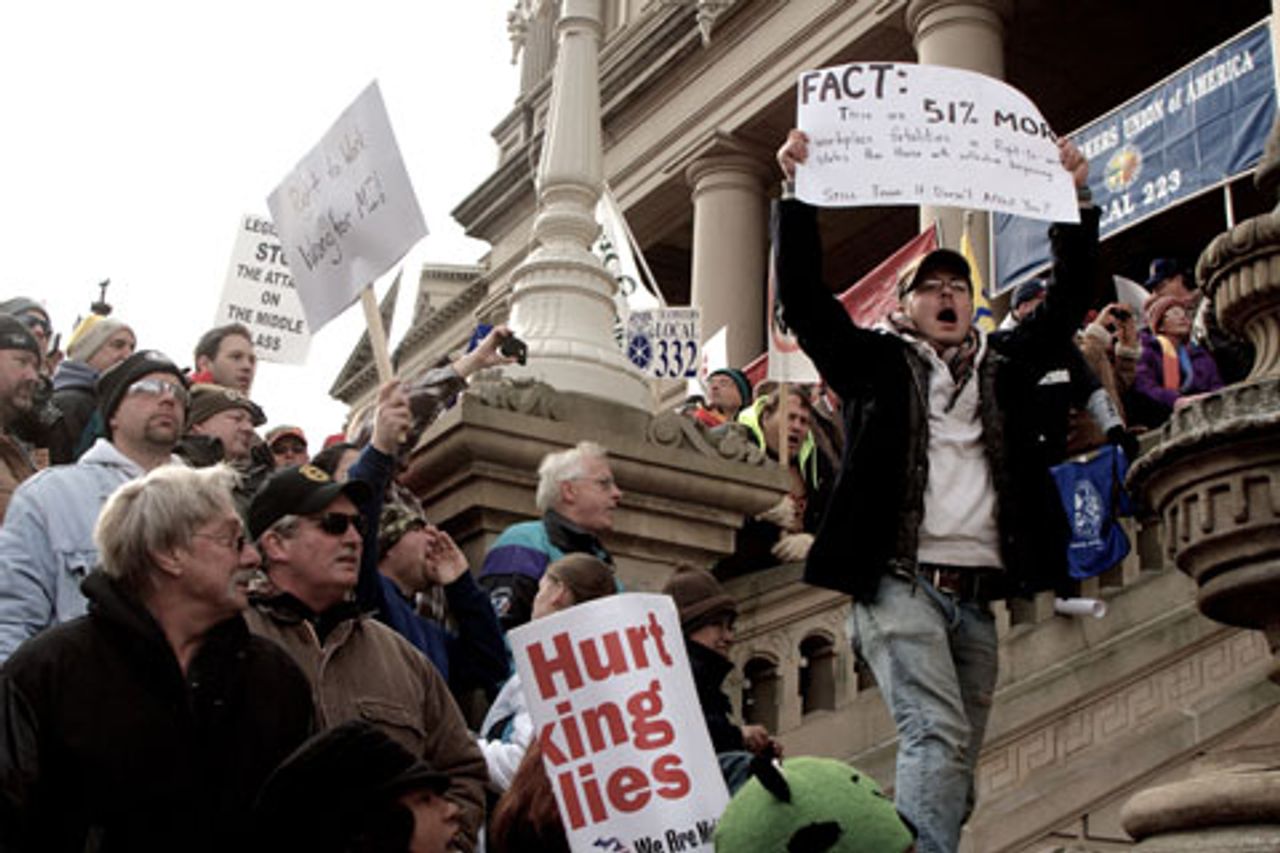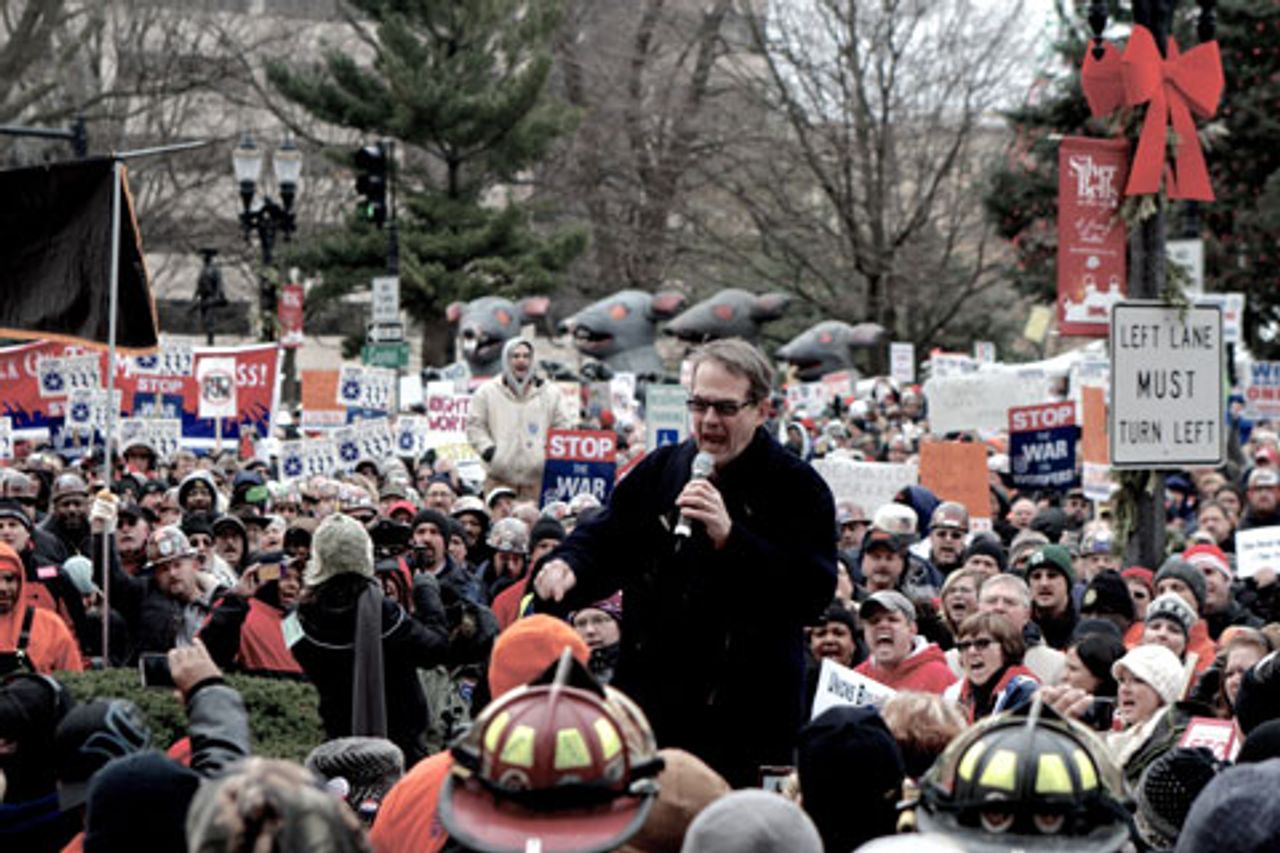Michigan Republican Governor Rick Snyder signed “right-to-work” legislation into law Tuesday evening. Michigan, the birthplace of the United Auto Workers 75 years ago and one of the most heavily unionized states in the country, becomes the 24th state in the US to adopt the anti-worker measure.
The law, when it takes effect in April, will bar collective bargaining agreements that require workers to pay union dues or fees as a condition of employment. In contrast to its misleading name, the measure is aimed at undermining collective resistance by workers to attacks on jobs, living standards and working conditions. In states with such laws, workers on average earn $1,500 less in annual wages and have fewer benefits.
 Part of the crowd at the demonstration
Part of the crowd at the demonstrationThe passage of the bill by the Republican-controlled state legislature and the inability of the UAW and other unions to mount any serious opposition reflect both the political bankruptcy of these organizations and the erosion of any genuine mass base of support among workers for them. The UAW and the rest of the official unions are justifiably held in contempt by most workers, after more than three decades in which they have systematically betrayed every struggle and collaborated with the employers in the shutdown of factories and the imposition of mass layoffs and one round of wage and benefit cuts after another.
These organizations, notwithstanding their investment portfolios and armies of overpaid officials, have been exposed as Potemkin villages, which exist entirely at the pleasure of the ruling class. Once a section of the corporate-controlled political establishment withdraws its support and decides to do without the services of the unions in suppressing the class struggle, they are helpless.
The last thing the unions want, and what they fear above all, is a genuine movement of the working class against the attacks of big business and both of its political parties. Tied to the corporations by a thousand strings, they have based themselves for decades on corporatist union-management committees and slush funds. They have virtually abolished strikes, devoting their energies to blocking any collective struggle by workers. They are viscerally hostile to the workers they nominally represent.
The lesson the union bureaucracy drew from the mass protests in Wisconsin in 2011—which initially erupted outside of their control—was to make sure such a thing would never happen again.
Their only response to the Republican challenge to their flow of dues income is to move even further to the right. They will seek to prove their usefulness to the capitalist class by helping to destroy whatever remains of the past social gains of the working class. It is no accident that the day before the enactment of the right-to-work law, the UAW played host to President Obama and cheered as he promoted his austerity plan to gut basic social programs.
 UAW President Bob King addresses the rally on Tuesday
UAW President Bob King addresses the rally on TuesdayIn the run-up to the vote on the right-to-work bill, the UAW and leading Democrats held days of closed-door discussions with Governor Snyder. UAW President Bob King pleaded with Snyder, pledging to establish throughout the state the kind of “partnership” the UAW maintains with the auto bosses—one that has facilitated the destruction of hundreds of thousands of jobs, the halving of wages for new-hires, devastating cuts in benefits for retirees, the de facto abolishment of the eight-hour day, the gutting of overtime pay and the imposition of vicious speedup.
The UAW spearheaded a union- and Democratic Party-backed ballot initiative in last month’s election that would have, in the name of enshrining collective bargaining rights in the state constitution, sanctioned the right of the state to ban strikes by public workers. The initiative was heavily defeated.
In his appearance at an auto factory outside of Detroit on Monday, Obama opposed the right-to-work bill, arguing that the UAW had proven its merit by supporting his wage-cutting bailout of General Motors and Chrysler and helping restore the US auto companies to profitability.
Outside the Michigan state capitol in Lansing on Tuesday, protesters chanted slogans denouncing the bill as Republican legislators passed it. In the face of this historic attack, the turnout was only a few thousand, a tiny fraction of the 671,000 unionized workers in the state.
Despite the small turnout, police armed with riot gear and plastic handcuffs massed around the capitol building and restricted admission. One protester was pepper-sprayed, and two were arrested. The anger of workers—which included delegations of building trades workers, teachers, auto workers and retirees—contrasted sharply with the complacency of the union officials and Democrats who spoke during the demonstration.
James P. Hoffa, head of the Teamsters, called for circulating petitions, ballot initiatives against the right-to-work bill and the replacement of Republicans with Democrats—repeating the dead-end perspective the union bureaucracy used to smother the Wisconsin protests.
UAW President Bob King gave a demagogic speech, calling for a coalition of “the 99 percent” to fight the measure. “This is a national attack,” he said, led “by very wealthy right-wing people who do not believe that everyone in America should do better together.”
The solution, he said, was to create a “broad progressive coalition” around various middle-class protest issues such as affirmative action, reproductive rights and environmentalism. “We just won Michigan for President Obama by 9 percent. We did it because we built a broad progressive coalition,” said King.
The Republicans have exploited the deep and justified resentment towards the union executives—Hoffa, for example, brought home $372,489 last year—to push through a law to intensify the exploitation of the working class.
At the same time, the collapse of the unions—the inevitable product of their decades-long defense of the capitalist system and their economic nationalism—removes a critical buffer between the working class and the corporate and financial elite that has long been used to suppress the class struggle.
With the corporations and both big business parties determined to make the working class pay for the capitalist crisis, the stage is being set for an enormous eruption of social opposition. Just as an earlier generation rebelled against the old American Federation of Labor to build the industrial unions, workers today will have to forge new organizations of struggle to defend their jobs and living standards.
What is needed are rank-and-file committees organized independently of the corporatist trade unions and the Democratic Party and committed to mobilizing the entire working class in industrial and political struggle against the corporate-financial elite.
The defense of the most basic democratic and social rights of the working class requires a new political perspective and strategy. It is necessary to break the stranglehold of the banks and big business and reorganize economic life on the basis of social need, not private profit. Workers must build their own mass party to carry this out—a party that fights for the unity of all workers in the US and around the world and for social equality, that is, for socialism. The Socialist Equality Party is leading that fight.
